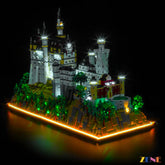How to Build A LEGO Phone Stand: A Step-by-Step Guide
We're constantly using our phones for entertainment, video calls. Today, I'll show you how to create an adjustable, sturdy phone stand using LEGO bricks – complete with a clever gear mechanism that lets you adjust the viewing angle with precision!
The Engineering Challenge
Step 1: Building the Foundation
Every great structure starts with a solid foundation, and our phone stand is no exception. The base needs to be wide and heavy enough to prevent tipping, even when supporting larger phones.
Step 2: Expanding for Stability
Once you have your initial base, it's time to make it even more robust. Stability is crucial – there's nothing more frustrating than a phone stand that topples over every time you touch the screen.
Step 3: Installing the Gear System
Here's where the magic happens! The adjustability of our phone stand comes from a carefully designed gear system using LEGO Technic elements. The star of the show is the worm gear – a cylindrical gear with helical threads that meshes with a standard gear wheel.
Step 4: The Self-Locking Advantage
The beauty of using a worm gear system lies in its self-locking properties. Unlike other gear arrangements, a worm gear cannot be back-driven – meaning the gear wheel cannot turn the worm. This is crucial for a phone stand because it means your carefully adjusted viewing angle will stay exactly where you set it, even if you bump the stand or press on your phone's screen.
Technical Benefits:
- No slipping under load
- Maintains position indefinitely
- Smooth, controlled adjustment
- Professional-grade stability
Step 5: Creating the Phone Rest
The phone rest is the visible part of your stand, so both function and aesthetics matter here. You'll want to create a surface that securely holds your phone while allowing easy insertion and removal.
Build up from your gear system to create an angled rest. The angle should be connected to your gear wheel so that turning the front control adjusts the rest's position. Use smooth tiles on the contact surfaces to prevent scratching your phone.
Design Considerations:
- Create guides or channels to center the phone
- Ensure the rest can accommodate phones with cases
- Add slight lips or barriers to prevent sliding
- Consider cable management for charging
Step 6: Final Assembly and Testing
With all components built, it's time for final assembly and testing. This is where you'll fine-tune the mechanism and make any necessary adjustments.
Advanced Building Tips and Techniques
Structural Integrity: When building with LEGO, always think about stress distribution. Use longer beams and plates to span gaps, and avoid creating single points of failure. The connection between your adjustable mechanism and the base is particularly critical.
Precision Building: For mechanical elements like gears, precision is key. Even small misalignments can cause binding or excessive wear. Take time to ensure all axles are perfectly parallel and that gears mesh properly without being too too loose.
Customization Options: Once you've mastered the basic design, consider these enhancements:
- Add LED lighting for nighttime use
- Include cable management systems
- Create interchangeable rests for different devices
- Add wireless charging integration
So grab your LEGO collection, clear some space on your building surface, and create your own adjustable phone stand. Happy building, and enjoy binge-watching your favorite shows with your new, perfectly angled LEGO creation!































